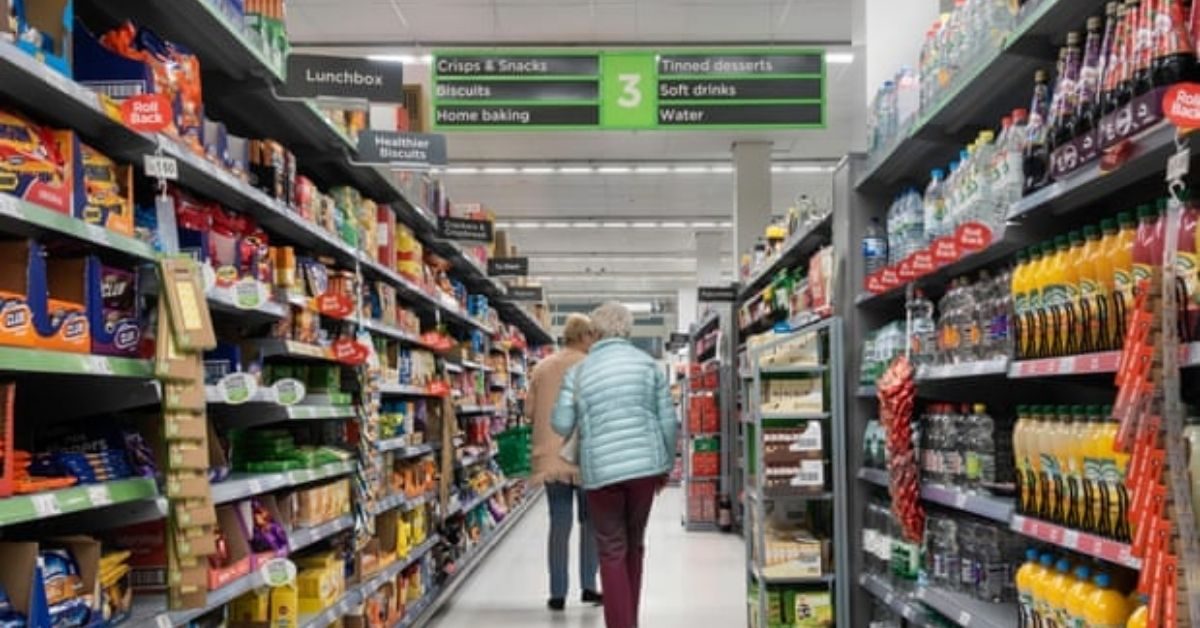The prices of tea, wine, meat and fish in UK supermarkets are set to rise as deliveries caught up in the Red Sea crisis finally hit shelves.
Iranian-backed Houthi rebels intensified their attacks on cargo ships in the Suez Canal two weeks ago, in protest over Israel’s military action against Hamas.
Since then, more than 300 cargo ships have had their routes diverted, forcing them to travel 3,500 extra nautical miles around Africa at an estimated additional cost of $2m (£1.6m) in fuel and transit costs per trip.
This has delayed their routes by up to two weeks, according to the Institute of Export and International Trade (IOE&IT). Goods from affected ships are only now reaching UK shores.
It comes amid increased speculation that the US and UK are preparing to launch a wave of air strikes in retaliation for the attacks on container ships, which could exacerbate delays.
The British Retail Consortium has warned that higher transportation and shipping insurance costs as a result of the longer transit could have a knock-on impact on supermarket prices.
Helen Dickinson, chief executive at the trade group which represents British supermarkets, said retailers “will work hard to ensure customers are not affected”.
But Marco Forgione, director general of the IOE&IT, told i: “We are about to see increases to pricing in supermarkets as it’s the products that are coming through now that have been impacted.
“We are in for what could be a very difficult time which may well take longer than a few months to resolve.”
Items that may be delayed or could be affected by supply problems include fruit, clothes, rice, palm oil – which could affect the cost of ready meals – lamb, beef, seafood, grains, wine, tea and coffee, he added.
A spokesperson for the BRC pointed out that food products from the EU will remain unaffected, however items that are imported from further afield may see supply issues.
Britain imports around 30 per cent of its food from the EU and just under 20 per cent from the rest of the world. Unnamed senior Indian government officials last week told a newspaper in India that the disruption could raise the global export price of basmati rice by between “15 and 20 per cent”.
According to The Times, eight of the 20 ships attacked in the 30 days before Christmas in the Red Sea were either UK-registered, had British citizens in their crew or carried goods for the UK.
The Houthi attacks have convulsed the “just-in-time” supply chains between Europe and Asia that are reliant on shipping from container vessels to oil tankers being able to pass through the Suez Canal.
Some 12 per cent of all global trade passes through the Red Sea route, including about a third of all container shipping.
Maersk, the Danish shipping giant, announced on Sunday that it was once more suspending sailings by its vessels through the Red Sea following an attempted piracy attack by the Yemen-based rebels which was averted by American naval forces.
The major shipping companies – Maersk, MSC, CMA CGM and Chinese-owned Cosco – re-routed dozens of vessels around Africa once Houthi attacks began to increase in November, adding 10 days to average journeys from Asia to Europe.
The US and UK recently announced a coalition to protect shipping and to reassure shipping companies and insurers after multiple attacks on vessels, but it is not yet clear what form this protection will take.
The agreements had seen companies begin to restore timetables for ships passing through the Suez Canal in recent days. But the continued attacks have introduced added fresh uncertainty to schedules and costs.
Houthi attacks in the Red Sea have involved more than 100 drones and missiles, targeting 10 commercial ships, according to the Pentagon. US Defence Secretary Lloyd Austin described the attacks as “unprecedented”.
As a result, the cost of insurance for these ships has more than doubled, Mr Forgione said.
“The markets are anticipating this is going to be a prolonged and difficult period of time for many months,” he said.
“It is impossible to say how much the price increases will be yet, but we will see them in the upcoming weeks.
“We’ve seen notices from French shippers saying they are having to charge a premium – $750 (£590) additional charge for a 20ft container – on top of contracted rates, all of that is going to very quickly feed through. That is a very significant increase.”
He believes this will cause inflation for certain items – food and clothes that are made outside the EU in particular – due to deliveries being delayed by ships having to travel around the Cape of Good Hope to avoid the Suez.
“You also have the risk of spoilage, as you have meats, prawns and other chilled goods that have been in ships for two weeks longer than intended,” Mr Forgione said.
“We will absolutely see pressure on supermarket prices and pressure on the global inflation rate.”
Where does the UK get its food?
The Suez Canal accounts for nearly a third of the world’s container traffic, much of it containing finished goods from China and Asia such as televisions or trainers, as well as 10 per cent of all oil tankers and 8 per cent of liquified natural gas shipments.
It is also a major conduit for foodstuffs such as grain and palm oil – a key ingredient in products from chocolate to ready-meals.
In 2020, 54 per cent of domestic consumption came from UK production (based on unprocessed value at farmgate), 28 per cent came from the EU and the remaining 18 per cent from the rest of the world.
42 countries accounted for 90 per cent of imported supply, and 27 for 80 per cent.
Why are shipping costs rising?
In Denmark, the shipping industry has agreed to double wages for crew travelling through the zone to reflect the increased danger.
Hapag-Lloyd, a German firm, has announced a new surcharge of up to $1,500 per container for shipments into Europe through the Arabian Gulf starting on 1 January.
Firms will also see a sharp rise in fuel costs for those ships which will be forced to take alternative routes as well as face increased insurance.
Some companies are already switching to “intermodal” transport routes, choosing to dock their cargo in Dubai before moving it onto planes.
However, moving freight by air is far more costly.
Why will this impact the price of food and goods?
About 12 per cent of the world’s seaborne oil and 8 per cent of liquefied natural gas, passes through the Bab al-Mandeb strait.
American financial experts S&P Global said large retailers such as Walmart and Ikea are likely to face the biggest impact as they struggle to import consumer goods.
Hellmann Worldwide Logistics in Germany told Reuters it was already seeing increased costs for items such as clothing, electronics and tech.
One supply chain expert in the region told i last month that a sustained period of significantly reduced traffic through the Suez Canal could drive up prices of some products by as much as 15 per cent.
Samer al-Madhoun, managing director of Jordan-based consultancy Muhakat, said: “We will end up paying more for our goods, maybe an extra 15 per cent… the consumer will end up paying more for their holidays, food, most of what they buy.
“It is basic economics that the longer the path taken by ships, the higher the cost.”
Supermarkets are understood to be privately concerned that while the recent dramatic increases to food prices have slowed, they will start to rise again with the Red Sea crisi being one of many factors affecting their pricing.
Ms Dickinson said: “Retailers are working hard to bring prices under control, with food inflation halving in the last six months, however, there are many challenges ahead.
“Large cost rises in 2024, including a 6.7 per cent rise to business rates and new border checks, threaten to put renewed pressure on prices for consumers.”
Professor Stephen Millard of the National Institute of Economics and Social Research, said the Red Sea blockades “will raise costs and put upwards pressure on inflation”.
“The question is, of course, how great the effect will be? We don’t know yet, but suffice it to say that the Bank – as well as us – will be attempting to quantify this effect before it makes its next decision on the base rate in February,” he said.








